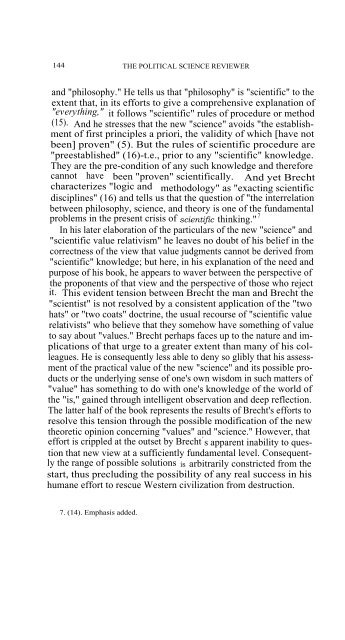ARNOLD BRECHT'S POLITICAL THEORY REVISITED Political ...
ARNOLD BRECHT'S POLITICAL THEORY REVISITED Political ...
ARNOLD BRECHT'S POLITICAL THEORY REVISITED Political ...
Create successful ePaper yourself
Turn your PDF publications into a flip-book with our unique Google optimized e-Paper software.
144 THE <strong>POLITICAL</strong> SCIENCE REVIEWER<br />
and "philosophy." He tells us that "philosophy" is "scientific" to the<br />
extent that, in its efforts to give a comprehensive explanation of<br />
"everything," it follows "scientific" rules of procedure or method<br />
(15). And he stresses that the new "science" avoids "the establishment<br />
of first principles a priori, the validity of which [have not<br />
been] proven" (5). But the rules of scientific procedure are<br />
"preestablished" (16)-t.e., prior to any "scientific" knowledge.<br />
They are the pre-condition of any such knowledge and therefore<br />
cannot have been "proven" scientifically. And yet Brecht<br />
characterizes "logic and methodology" as "exacting scientific<br />
disciplines" (16) and tells us that the question of "the interrelation<br />
between philosophy, science, and theory is one of the fundamental<br />
problems in the present crisis of scientific thinking." 7<br />
In his later elaboration of the particulars of the new "science" and<br />
"scientific value relativism" he leaves no doubt of his belief in the<br />
correctness of the view that value judgments cannot be derived from<br />
"scientific" knowledge; but here, in his explanation of the need and<br />
purpose of his book, he appears to waver between the perspective of<br />
the proponents of that view and the perspective of those who reject<br />
it. This evident tension between Brecht the man and Brecht the<br />
"scientist" is not resolved by a consistent application of the "two<br />
hats" or "two coats" doctrine, the usual recourse of "scientific value<br />
relativists" who believe that they somehow have something of value<br />
to say about "values." Brecht perhaps faces up to the nature and implications<br />
of that urge to a greater extent than many of his colleagues.<br />
He is consequently less able to deny so glibly that his assessment<br />
of the practical value of the new "science" and its possible products<br />
or the underlying sense of one's own wisdom in such matters of<br />
"value" has something to do with one's knowledge of the world of<br />
the "is," gained through intelligent observation and deep reflection.<br />
The latter half of the book represents the results of Brecht's efforts to<br />
resolve this tension through the possible modification of the new<br />
theoretic opinion concerning "values" and "science." However, that<br />
effort is crippled at the outset by Brecht ' s apparent inability to question<br />
that new view at a sufficiently fundamental level. Consequently<br />
the range of possible solutions is arbitrarily constricted from the<br />
start, thus precluding the possibility of any real success in his<br />
humane effort to rescue Western civilization from destruction.<br />
7. (14). Emphasis added.
















